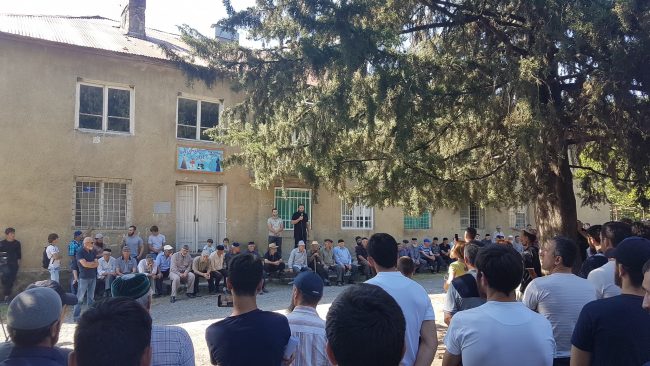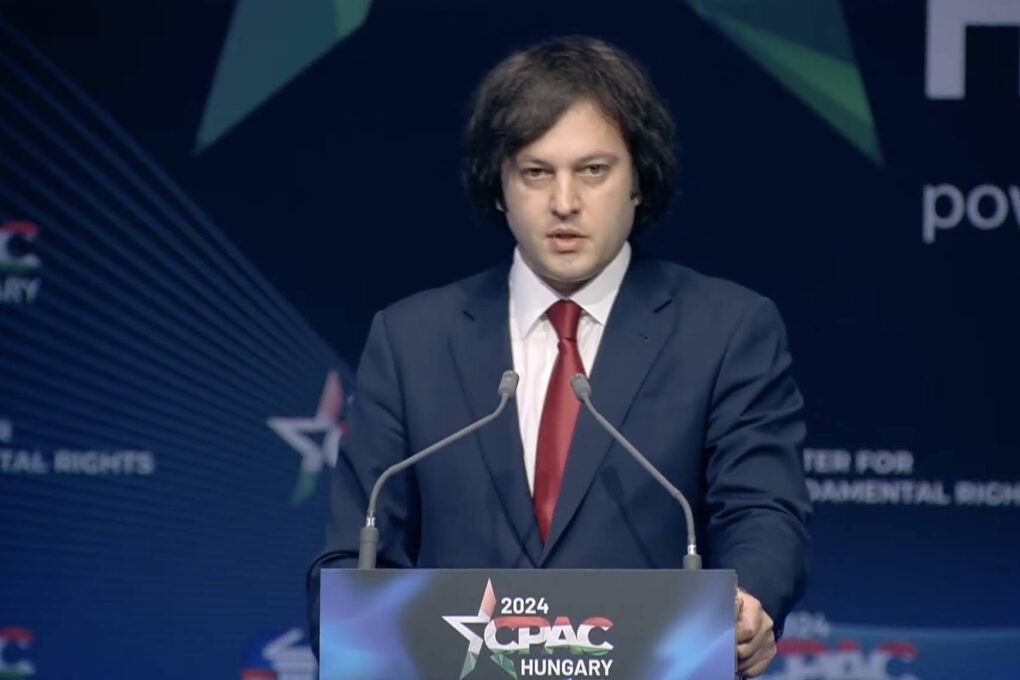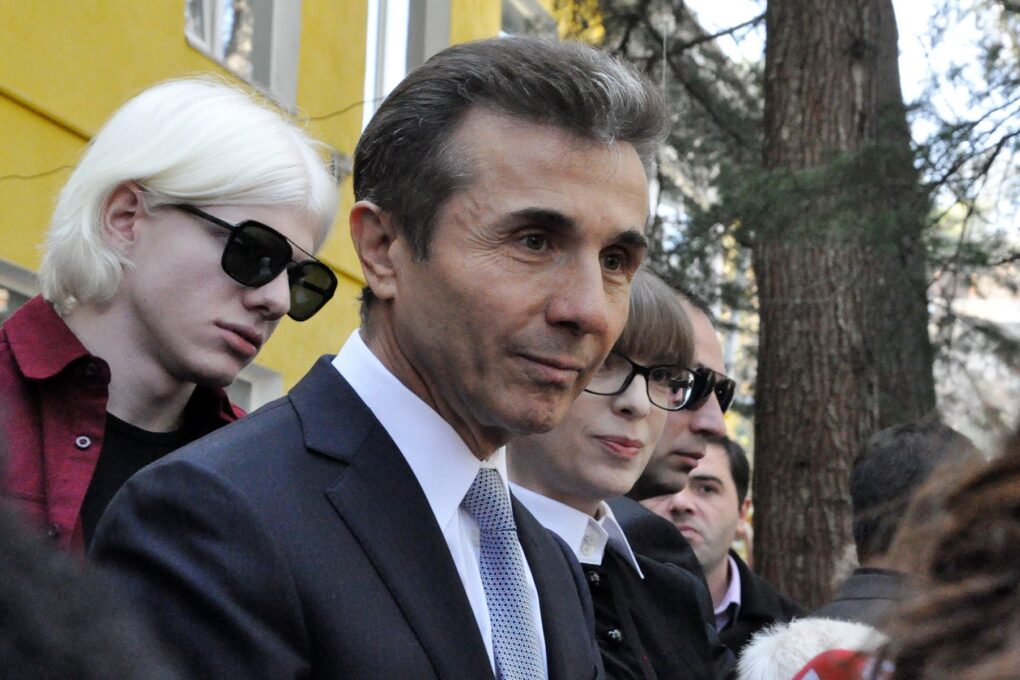
 Opponents of hydropower plant construction in Georgia’s Pankisi Valley have complained that the authorities have been applying pressure on activists to cease their opposition. A protest was held on Friday in Duisi, the largest village in the valley, against the construction of three new hydroelectric power stations.
Opponents of hydropower plant construction in Georgia’s Pankisi Valley have complained that the authorities have been applying pressure on activists to cease their opposition. A protest was held on Friday in Duisi, the largest village in the valley, against the construction of three new hydroelectric power stations.
In an open letter addressed to the President, Prime Minister, Parliamentary Speaker, Public Defender, and diplomatic missions to Georgia, demonstrators called on the government to halt the construction of the power plants and to develop a plan for ‘alternative, sustainable economic development’ of Pankisi. They urged parliament to ensure proper oversight of government policy in Pankisi, which they said was ‘alienating the local community and widening mistrust, especially among youth’.
According to the letter, if built, the three new hydroelectric power plants, in addition to two that are already complete, would make living in Pankisi ‘practically impossible’.
They condemned what they said were attempts by the authorities to pressure opposition to the projects, by summoning critics to police stations. Opponents of the power plants claimed that after obstructing construction in Birkiani — where the Khadori 3 station is being built — on 29 June, regional police began calling people in for ‘talks’ to dissuade them from ‘acting against the interests of the state’.
The protesters said they were concerned that power plants would destroy the River Alazani’s ecosystem, cause water shortages for pastures, drinking, and irrigation, and strip the valley of its potential to increase tourism.
They claimed ‘the authorities were trying to weaken their resistance’, calling ‘the state’s intervention against defenders of the public interest’ ‘unbelievable’. Signatories to the letter claimed to be in favour of increasing the country’s energy independence, but through ‘just and long-term development’ rather than hydroelectric plants, which according to them, have low energy efficiency and serious ecological and social consequences.
‘Don’t send the police after us, come to the valley and talk to us’, one of the speakers said at the rally. Demonstrators said that they had collected 3,000 signatures in support of the letter.
Sulkhan Bordzikashvili, a freelance journalist and a member of the Youth Initiative Group of Pankisi, told OC Media that police began to summon protesters the day after they obstructed the construction. ‘Police first invited young people to talk, but later elders too, which irritated people’, said Bordzikashvili.
Earlier on Friday, Alazani Energy Director Lasha Iordanishvili told Pankisi Community Radio that the latest of these meetings with police took place at the Telavi Regional Division of Kakheti Police Department and that Deputy Interior Minister Kakha Sabanadze was present. Speaking to Palitra News, another local opponent of the hydropower plants, Marseli Balakashvili, corroborated the story, saying he was among those summoned to Telavi.
OC Media has reached out to the Interior Ministry for comment.
In addition to the construction of dams, speakers at the protest railed against the deadly special operation carried out in the valley in December that killed 19-year-old Temirlan Machalikashvili, as well as the authorities’ reaction to it. They said the operation was ‘a demonstration of power’ and accused the authorities of waging an ‘information war’ against Machalikashvili’s family, rather than punishing those ‘guilty of excessive force’. Protesters urged Prime Minister Mamuka Bakhtadze to take Machalikashvili’s case under his personal control and to make sure those responsible for his death face justice.
[Read more about latest alleged media campaign against Machalikashvili on OC Media: ‘Leaked evidence’ links Pankisi’s Temirlan Machalikashvili to terror groups]
Environmental risks
The Khadori 3 hydroelectric power plant is scheduled to be completed by the end of 2019, according to plans from construction company Alazani Energy. The water to the plant will come from the Khadori 2 channel, with a 4.5 km water tunnel from the River Alazani, generating up to 5 MW of electricity.
The Khadori 3 project has faced opposition from local people from the start. Alazani Energy and government officials met with critics several times in Tbilisi, promising to create more than 100 jobs in the first year of the project.
According to Bordzikashvili, Alazani Energy later promised to employ only about 80 locals for the construction, and only a handful after its completion. Bordzikashvili said that the previous hydroelectric power plant built in Pankisi caused water shortages for local people, and that the company failed to provide a fish ladder that would help the river’s fish survive.
The biggest challenge for Pankisi according to many of the protesters, is the effect the projects could have on the development of tourism, including rafting, that could be completely stopped if hydropower stations are built along the entire length of the Alazani in Pankisi.
In its Environmental Impact Assessment, Gamma Consulting, predicted a possible worsening of the river's water quality and widespread detriment to the area’s ecosystem. Georgian environmental group the Green Alternative criticised the report, stressing that the consequences will be far more severe, including serious problems for the local population’s water supply and destruction of the whole Alazani River ecosystem.
Based on the Green Alternative’s findings and alleged irregularities in the procedures of issuing construction permits for the project to go ahead, EMC filed a lawsuit in early July demanding the permit for Alazani Energy be voided.




 20 July 2018
20 July 2018


